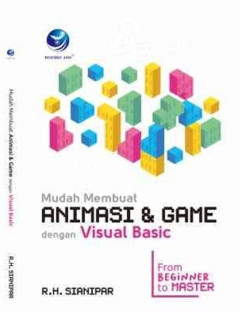Ditapis dengan

Mudahnya Membuat Animasi dan Game dengan Visual Basic
- Edisi
- -
- ISBN/ISSN
- 978-623-01-1906-4
- Deskripsi Fisik
- xii, 324 hlm.; 16x23 cm
- Judul Seri
- -
- No. Panggil
- Sir 006.686 9 SIA m
- Edisi
- -
- ISBN/ISSN
- 978-623-01-1906-4
- Deskripsi Fisik
- xii, 324 hlm.; 16x23 cm
- Judul Seri
- -
- No. Panggil
- Sir 006.686 9 SIA m

PENERAPAN LAYANAN INFORMASI MELALUI METODE AUDIO VISUAL KEPADA ORANG TUA UNTU…
- Edisi
- -
- ISBN/ISSN
- -
- Deskripsi Fisik
- xv,117hlm.;25cm
- Judul Seri
- -
- No. Panggil
- 006.5 KHU p
- Edisi
- -
- ISBN/ISSN
- -
- Deskripsi Fisik
- xv,117hlm.;25cm
- Judul Seri
- -
- No. Panggil
- 006.5 KHU p

Graduate programs in media literacy. e-jurnal
Appalachian State University offers a Master's degree in Media Literacy as a part of the Master of Arts in Educational Media program. Founded in 1999 by media literacy expert Dr. David Considine, the program offers study in media literacy theory and pedagogy, media production, and instructional technology. Targeting those in K-12 and youth education, the program uses a flexible approach based o…
- Edisi
- Vol. 37, Issue 2
- ISBN/ISSN
- 0300-7472
- Deskripsi Fisik
- -
- Judul Seri
- -
- No. Panggil
- -

National Association for Media Literacy Education (NAMLE) formerly Alliance f…
NAMLE was founded at the National Media Education Conference in 2001 as the Alliance for a Media Literate America (with roots that go back to its origins as Partnership for Media Education in 1997, a public/private collaboration in leaded to stimulate professional development in the then-fledgling media literacy Held). It is a national membership organization dedicated to advancing the field of…
- Edisi
- Vol. 37, Issue 2
- ISBN/ISSN
- 0300-7472
- Deskripsi Fisik
- -
- Judul Seri
- -
- No. Panggil
- -

Mediatized Conflict and Visual News Framing: How Swiss Audiences React to New…
The Syrian conflict has challenged both the ways of reporting war and its impact on the public. However, only a few empirical studies have tried to assess public reactions to representations of war. In this paper, we use an empirically-based study that combines quantitative and qualitative methods to assess how Swiss audiences react to crisis reporting and visual news framing in French-speaking…
- Edisi
- Vol. 10 Issue 2/3
- ISBN/ISSN
- 1873-9857
- Deskripsi Fisik
- -
- Judul Seri
- -
- No. Panggil
- -

Trends of Academic Media Elites Towards Employing “Infographics” in Media…
The research aims to establish academic attitudes and trends towards what the research calls (Infographic media), and to pay greater attention to employ academic studies in Arab media practices, and in a focus towards media and data journalism, as it aims to define the history and future of integrative and associative relations between scientific Infographics and mass communication sciences lay…
- Edisi
- Issue 34
- ISBN/ISSN
- 1658-3620
- Deskripsi Fisik
- -
- Judul Seri
- -
- No. Panggil
- -

The reality of feminization of the audiovisual media in Algeria Empirical stu…
- Edisi
- -
- ISBN/ISSN
- -
- Deskripsi Fisik
- -
- Judul Seri
- -
- No. Panggil
- -
- Edisi
- -
- ISBN/ISSN
- -
- Deskripsi Fisik
- -
- Judul Seri
- -
- No. Panggil
- -

Visualization and interactivity in data journalism projects. E-Journal
Data journalism, as a new form of journalism, is gaining ever greater ground on newsrooms. Datasets and visualization applications have contributed to its bloom. Data and visualizations have a dominant role in the journalistic article, and their introduction affects the narration of the story, too. It is, also, considered by news organizations as a tool which provides information to users in me…
- Edisi
- vol. 09
- ISBN/ISSN
- 2170-0982
- Deskripsi Fisik
- -
- Judul Seri
- -
- No. Panggil
- -

Panduan Lengkap Pemrograman Android
- Edisi
- Ed. 1 .--
- ISBN/ISSN
- 978-979-29-5346-6
- Deskripsi Fisik
- xviii, 510 hlm .; 20 x 28 cm .,
- Judul Seri
- -
- No. Panggil
- 005.118 ZAM p
- Edisi
- Ed. 1 .--
- ISBN/ISSN
- 978-979-29-5346-6
- Deskripsi Fisik
- xviii, 510 hlm .; 20 x 28 cm .,
- Judul Seri
- -
- No. Panggil
- 005.118 ZAM p

Mudah Belajar Visual Basic Net
- Edisi
- Cet.1.--
- ISBN/ISSN
- 978-602-1514-99-3
- Deskripsi Fisik
- xvi, 751 hlm., 23 cm
- Judul Seri
- -
- No. Panggil
- 005.118 BUD m
- Edisi
- Cet.1.--
- ISBN/ISSN
- 978-602-1514-99-3
- Deskripsi Fisik
- xvi, 751 hlm., 23 cm
- Judul Seri
- -
- No. Panggil
- 005.118 BUD m
 Karya Umum
Karya Umum  Filsafat
Filsafat  Agama
Agama  Ilmu-ilmu Sosial
Ilmu-ilmu Sosial  Bahasa
Bahasa  Ilmu-ilmu Murni
Ilmu-ilmu Murni  Ilmu-ilmu Terapan
Ilmu-ilmu Terapan  Kesenian, Hiburan, dan Olahraga
Kesenian, Hiburan, dan Olahraga  Kesusastraan
Kesusastraan  Geografi dan Sejarah
Geografi dan Sejarah